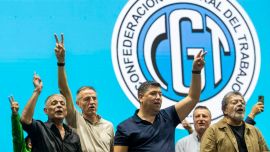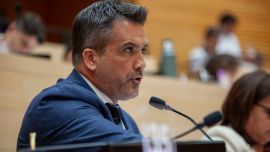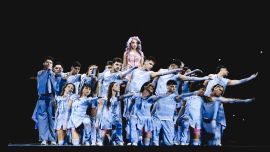Despite an impressive comeback by President Mauricio Macri, Alberto Fernández won the presidential elections in the first round vote, cementing the return of Peronists – and Cristina Fernández de Kirchner – to power. The end result was the expected one by most people, perhaps with the exception of a growing number of supporters of the incumbent president, who surprisingly climbed back from the abyss to clock in what some have called a “dignified” defeat. The election had a dual consequence that ultimately softened its impact on the majority of people’s expectations and the markets: first of all, nearly everyone was ready for a win by the ‘Fernández-Fernández’ ticket, and, secondly, Macri’s nearly 41 percent of the vote has set up a much more balanced Congress than previously expected.
All m of this, of course, must be taken into context. Two other events have been extremely meaningful in keeping the nation under relative calm despite the dangers of the current socio-political and economic situation. In an unprecedented circumstance for Argentina’s fragile democracy, the outgoing president invited the electoral winner of the opposite political party to the Casa Rosada for breakfast the morning after the election. And he agreed. While the end of Fernández de Kirchner’s mandate was defined by the belligerence toward Macri – to the point where the constitutionally ordained protocol wasn’t even respected – Mauricio and Alberto had a productive one-hour meeting on Monday where they discussed the transition.
The main concern for Alberto and his team was the economic situation. In particular, the acceleration of a haemorrhaging of foreign exchange reserves with which Central Bank Governor Guido Sandleris sought to maintain economic order until the election. The second situation is the hardening of the so-called ‘cepo’ or set of currency restrictions, supposedly anathema to Macri’s economic worldview, and more of a page out off the Kirchnerites’ playbook than his own. Sandleris, along with Finance Minister Hernán Lacunza, have overseen the impossible task of keeping Argentina from falling off a cliff since the fateful PASO primaries, when, with the Central Bank on the sidelines, the pesodollar exchange rate went haywire, sparking financial mayhem. According to Clarín journalist Marcelo Bonelli, Sandleris received a call from one of Alberto’s closest advisers in economic matters, Guillermo Neilsen, calling him out for having burnt through so many dollars. Sandleris defended himself claiming it was an order from the Executive, the journalist explained, which would of course confirm the lack of Central Bank independence that appears explicit externally.
Yet, the hardened cepo has succeeded in putting a tourniquet that has given us an artificial sense of calm in the market. While the informal and illegal black market rates have behaved in the week since the election, this level of capital controls by definition destroys economic activity. It isn’t clear whether the decision to harden the cepo was Alberto’s, Macri’s, or the fruits of consensus, yet it did seem like the only possible patch ahead of a transition period in which the president-elect will do as much as possible in order to peg any and all economic decision to the incumbent. This is Macri’s mess, Fernández claims.
This, then, relates to Alberto’s unexpected silence on economic terms. Some have begun to publish stories indicating that Matías Kulfas will effectively be the next economy minister, such as the aforementioned Bonelli and La Nación’s Willy Kohan. Whether it is Kulfas or one of the other names being mentioned — Neilsen, Cecilia Todesca, Emmanuel Álvarez Agis, Martín Redrado, to name a few — they will all face an extremely challenging situation, and they all generally believe consumption needs to increase if Argentina is to get out of this mess.
Of course, the first thing that needs to happen is a renegotiation of Argentina’s sovereign debt, in particular with the International Monetary Fund which is Argentina’s largest creditor. In Alberto’s favour, US President Donald Trump phoned him on Friday to congratulate him on the win, while noting he had ordered his team in the IMF to help Argentina. “I’ve instructed my team at the IMF to work with you, so don’t hesitate to call me,” the US president told Fernández, showing that Trump also doesn’t really care for the sanctity of institutions (the IMF is a multilateral organisation).
Alberto has indicated he likes the idea of a “Uruguayan restructuring” which would imply an extension of maturities and no haircut. The market, instead, has priced in a 40-percent haircut, if bond prices can be taken as a proxy. Martín Guzmán, an Argentine economist at Columbia University who has had meetings with Alberto’s advisors, has argued that Argentina needs to kick debt repayments back several years, and reject the last tranche of IMF funding while concentrating on growth.
Whatever method Alberto’s economic team plans to propose, the question then becomes about short-term funding: how will he cover the deficit, which is composed of things like pension payments, public servant wages, and disbursements to social movements? How will the Alberto government finance policies that incentivise consumption?
Any negotiation with the IMF and Argentina’s private creditors will need to prove the country has chances to repay its debt at some point, meaning economic growth needs to be jumpstarted. This, in turn, implies some level of austerity in order to achieve a fiscal surplus and a series of reforms that make Argentina more competitive. Politically, Alberto would have the support of a pan-Peronist coalition that represents liberals and socialists. Cristina, his vice-president, knows her core support base in Buenos Aires Province is composed of those marginalised by the lack of economic growth, many of whom depend on social plans and assistance to eat. How that square can be circled remains to be seen.
With Macri in the opposition, Alberto can probably expect a similar situation to the one the incumbent faced in 2016. As a minority government, Macri’s Cambiemos (“Let’s Change”) coalition relied on the legislative support of Sergio Massa’s Renewal Front and the non-Kirchnerist Peronists. Alberto must tread carefully but steadily in order to gain the trust and support of the opposition, achieving a good negotiation with sovereign creditors and then finding a way to lift capital controls, while reforming the economy to jumpstart growth. Next year will be a tough year, but the conditions are there for Alberto to make true on his campaign promise of “putting Argentina back on its feet.”
All of this means a pragmatic, moderate and consensus-seeking president in the Casa Rosada will find people willing to work with him. Yet, an authoritarian Alberto, aggressive, bloodthirsty and willing to go to war with those who don’t think like him would sink Argentina into an even deeper crisis. Or, an internal fracture of his own space, with governors on the one side and La Cámpora youth militancy on the other, for example, could lead to gridlock and more recession.
Initial signs of an organised transition are positive, but Alberto’s
true colours were also evident in his victory speech.related news



















Comments